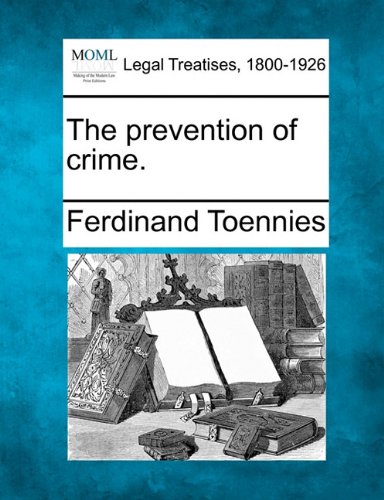Background
Ferdinand Tönnies was born on July 26, 1855, into a wealthy farming family near Oldenswort, in the North Frisian peninsula of Eiderstedt, then under Danish rule.



(The Making of the Modern Law: Legal Treatises, 1800-1926 ...)
The Making of the Modern Law: Legal Treatises, 1800-1926 includes over 20,000 analytical, theoretical and practical works on American and British Law. It includes the writings of major legal theorists, including Sir Edward Coke, Sir William Blackstone, James Fitzjames Stephen, Frederic William Maitland, John Marshall, Joseph Story, Oliver Wendell Holmes, Jr. and Roscoe Pound, among others. Legal Treatises includes casebooks, local practice manuals, form books, works for lay readers, pamphlets, letters, speeches and other works of the most influential writers of their time. It is of great value to researchers of domestic and international law, government and politics, legal history, business and economics, criminology and much more. ++++ The below data was compiled from various identification fields in the bibliographic record of this title. This data is provided as an additional tool in helping to insure edition identification: ++++ Harvard Law School Library ocm22478552 Reprinted from the International journal of ethics, October, 1891." Caption title. Philadelphia? : s.n., 1891?. 27 p. ; 24 cm.
http://www.amazon.com/gp/product/1240155476/?tag=2022091-20

( A classic in its field, Community and Society was not t...)
A classic in its field, Community and Society was not the first book to explore the composition of, and relationship between, these two types of social groups. Confucius spoke of fundamental social relationships between friends, family members, and rulers and subjects. Similarly, Plato, Aristotle, Thomas Aquinas, and other great thinkers produced clear-cut classical outlines of the two groups. More recently, Ferdinand Tönnies examines the clash between small-scale neighborhood-based communities and the large-scale competitive market society. In doing so, he considered all aspects of life political, economic, legal, and family; art, religion, and culture; construction of "selfhood" and "personhood"; and modes of cognition, language, and understanding. One of the first major studies of sociology, this republication of an important work will introduce Tönnies thoughts to a new generation of English-speaking students of sociology, political theory, and the history of European ideas.
http://www.amazon.com/gp/product/0486424979/?tag=2022091-20
Ferdinand Tönnies was born on July 26, 1855, into a wealthy farming family near Oldenswort, in the North Frisian peninsula of Eiderstedt, then under Danish rule.
One of seven children, he received his high school education in Husum, where he became deeply attached to the novelist and poet Theodor Storm. After studying classics at different German universities and taking his doctoral degree in 1877, Tönnies turned to philosophy, history, biology, psychology, economics, and ethnology as his ideas on scientific sociology began to take shape.
In Berlin in 1876 Tönnies began at the suggestion of his lifelong friend Friedrich Paulsen a study of the much-neglected philosophy of Thomas Hobbes. On his first of many journeys to England and also to France, Tönnies discovered in 1878 several original manuscripts by Hobbes, essential to better appreciation of his system of ideas and natural-law theory. In his first account (1879-1881) Tönnies argued the significance of Hobbes in the scientific revolution of the 17th century. Continuing his documentation, he published the standard monograph on Hobbes's life and works in 1896.
Beginning to lecture at the University of Kiel in 1882, at first on philosophy and government but soon extending his academic work to empirical social research and statistical methods, Tönnies devoted the next 6 years to working out his own social theory. His world-famous treatise Community and Society (1887) found little response in the intellectual climate of the Germany of Kaiser William II. The various schools of historicism disfavored the development of rigorously scientific social theory, and political practice in the Bismarck era refused to solve the pressing social problems of a rapidly growing industrial economy but fought the labor movement by legislation and police action even after 1890.
A clash with the Prussian university administration over Tönnies's connection with the German branch of the Ethical Culture movement and his outspoken reports on the Hamburg longshoremen's strike (1896-1897) made him suspect of radicalism if not socialist leanings; what promised to be the brilliant career of a gifted scholar was nipped in the bud. Yet, unremitting work on theoretical problems between 1894 and 1913, informed reviews of the growing world literature in the field, and prominent participation in the Verein für Sozialpolitik (Association for Social Politics) and the Gesellschaft für Soziale Reform (Society for Social Reform) increased Tönnies's reputation inside and outside Germany, creating an unusually wide disparity between scholarly stature and status in academic life. The external conflict was resolved in 1909 by his appointment to a full professorship in political economy at Kiel.
The early masterpiece had clearly been a first decisive step toward the systematic development of the new social science. As Tönnies's plans for this elaboration were frustrated at the most productive time of life, only a few papers of theoretical importance stem from the period before World War I.
Of two new projects formed in 1907, a critique of public opinion and a study in social history, one was completed only in 1922, the other introduced by the volume The Spirit of the Modern Age in 1935. With Max Weber and others Tönnies had founded the German Sociological Association in 1909 and, as its subdivision, the Statistical Association (1911). He had failed, however, to complete his systematic sociology.
After World War I, with prospects more favorable to social science and its academic recognition in the Weimar Republic, Community and Society went through several new editions. Now in his 60s, Tönnies carried out his design of a systematic sociology. The theoretical parts on social units, values, norms, and action patterns in the Introduction to Sociology (1931) were supplemented by three volumes of collected studies and critiques and by a series of papers on his empirical research. He reestablished the Sociological Association, remaining its president until 1933.
Tönnies acted on this solution also of the value problem. He relentlessly exposed the neoromanticism of the 1920s, just as his earlier critique of romanticism had been the cornerstone of the theory of Community and Society. But in 1933 he was deprived as "politically unreliable" of his status as professor emeritus. His death on April 9, 1936, spared him from being witness to the worst excesses of the Nazi dictatorship and from further indignities.
The German sociologist Ferdinand Tönnies pioneered sociology as an academic discipline of rigorously scientific character on a broad base of original studies in the history of ideas, epistemology, political science, economics, and social anthropology.
The Ferdinand Tönnies Society (Ferdinand-Tönnies-Gesellschaft) was founded 1956 in Kiel, with the vision of furthering sociological research in honor of Ferdinand Tönnies, as one of the founders of German sociology.
( A classic in its field, Community and Society was not t...)
(The Making of the Modern Law: Legal Treatises, 1800-1926 ...)
In 1894 Ferdinand Tönnies married Marie Sieck, they had five children.
Marie Sieck was the daughter of a Protestant minister from the Schleswegian town of Eutin.
